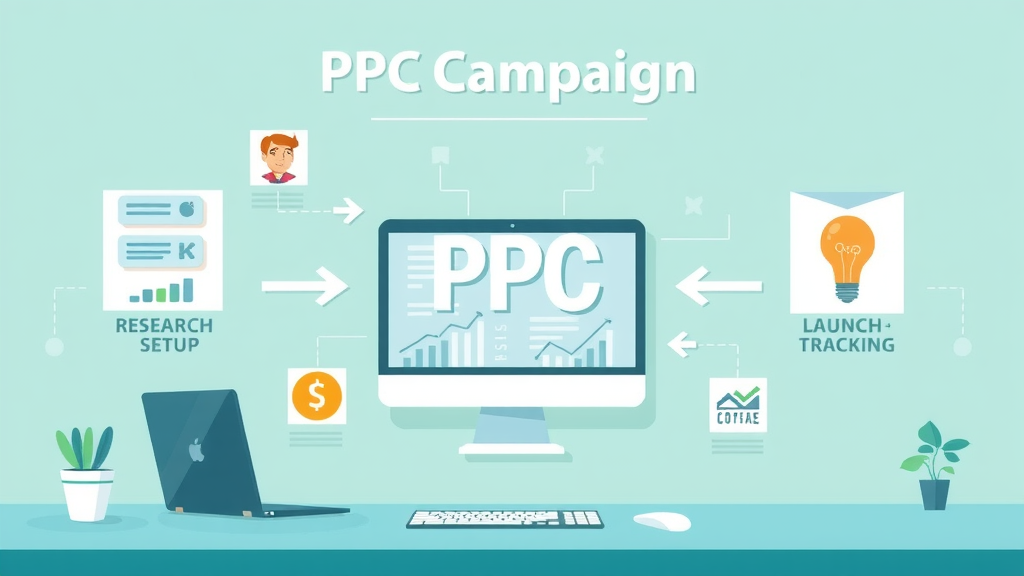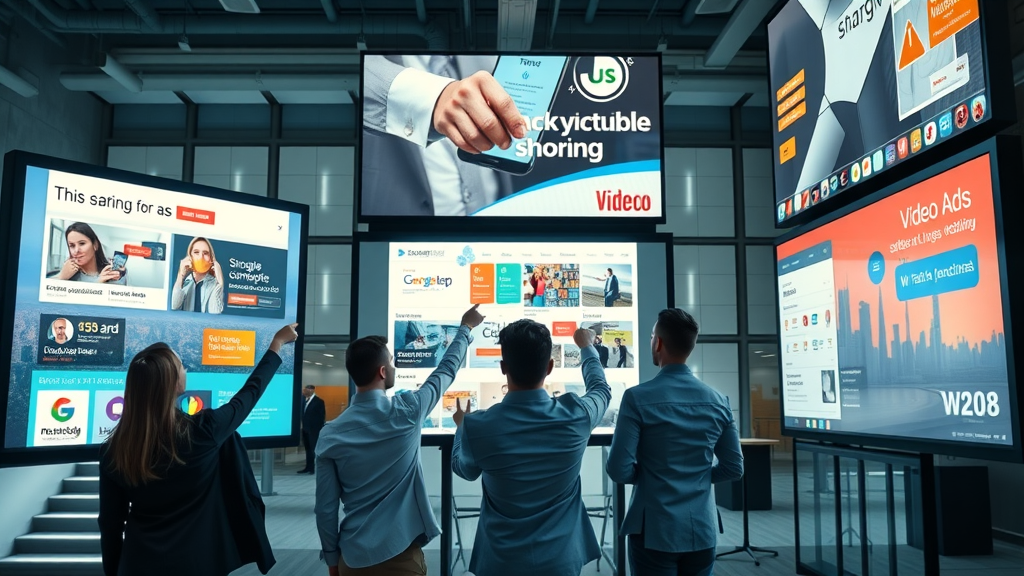Did you know businesses make an average of $2 in revenue for every $1 they spend on Google Ads? That’s ROI you can’t ignore. If you’re still waiting on organic traffic or unsure about digital advertising, the time to act is now. In today’s world, PPC campaigns have become the secret weapon behind fast, scalable, and measurable business growth. This comprehensive guide cuts through the clutter, giving you the knowledge and actionable steps to launch powerful ppc campaigns that maximize paid search performance, reduce cost per click, and drive real results—starting today.
Opening Insight: How PPC Campaigns Are Reshaping Paid Search for Unmatched ROI
In the fast-paced landscape of digital marketing, PPC campaigns are transforming how businesses approach paid search. Unlike traditional advertising methods, where results are slow and performance tracking is vague, PPC (Pay-Per-Click) programs put your business in front of motivated customers—immediately. With precision targeting, transparent analytics, and adaptive budgets, these campaigns empower both small businesses and industry giants to outmaneuver the competition. When executed with solid keyword research and a strong strategy, a ppc ad can secure top spots on crucial search engine results pages, attracting more leads ready to convert.
The best part? The impact of ppc campaigns is instantly measurable. Tools like Google Ads let you watch every click, impression, and conversion, giving you a clear read on your cost per click and overall return on investment. With PPC advertising, even a modest budget can deliver powerful results when managed correctly. Whether you’re a veteran marketer or just starting out, understanding how to leverage PPC can mean the difference between stagnant sales and explosive ROI.

“Businesses make an average of $2 in revenue for every $1 they spend on Google Ads.”
What You’ll Learn About PPC Campaigns
- The fundamentals and advanced insights of effective PPC campaigns
- Latest strategies for optimizing cost per click and growing paid search
- How to build, monitor, and refine your own PPC advertising campaigns
- What industry leaders say about successful google ads and ppc ads
- How to measure and maximize your PPC ROI

Understanding PPC Campaigns: Definition, Types, and Key Terms
What Are PPC Campaigns?
PPC campaigns, short for pay-per-click campaigns, are a form of ppc advertising in which businesses pay a fee each time a user clicks their ad. The most common platform, Google Ads, displays your ppc ad at the top of search engine results whenever someone searches a targeted keyword. This puts your product or service in view of people actively seeking what you offer, accelerating the path from search to sale.
PPC ads are not limited to search results alone. Today’s ppc campaigns can appear as display ads on partner websites, within mobile apps, or even as sponsored results on social media feeds. Whether your goal is direct sales, lead generation, or increased website traffic, these campaigns are highly customizable. By adjusting targeting, schedule, and spending, each ad campaign can be refined to attract the right audience and achieve your unique business objectives—all while keeping a close eye on cost per click and return on ad spend.
If you’re already running campaigns but not seeing the results you expect, it’s important to address common pitfalls quickly. For actionable steps to resolve underperforming ads and boost your ROI in record time, explore these proven methods to fix your PPC campaigns issues in 24 hours or less.
Types of PPC Advertising: Search Ads, Display Ads, and More
Knowing your options is key to a successful ppc campaign. The primary types include:
Search Ads appear at the top and bottom of search engine results when someone enters a relevant search term. Their format is text-based and offers maximum visibility to intent-driven users. Display Ads use images and graphics shown across a vast network of partnered websites, reaching users as they browse content related to your offering. Shopping Campaigns showcase products directly in search results with images, prices, and merchant names—perfect for eCommerce brands targeting shoppers. Video Ads are presented before, during, or after relevant video content, especially on platforms like YouTube. Finally, Remarketing Ads re-engage visitors who didn’t convert, reminding them of your brand as they continue online.
Choosing the right ad type depends on your business goals, audience, product, and competition. For example, search ads are ideal for high-intent actions, while display ads are used for boosting general brand awareness. Building a robust ads account structure that mixes and matches these formats lets you cover every stage of your customer’s journey. Monitoring ad rank and optimizing ad copy further increases your chance of a strong quality score and lower cost per click across the board.

Essential PPC Campaign Terminology Explained
Before you build a campaign, it pays to understand key terms. Cost per click (CPC) is the amount you pay each time someone clicks your ad. Quality Score is Google’s rating of your ad relevance and landing page experience—the higher it is, the less you pay for the same position. Impressions count each time your ad appears; click-through rate (CTR) shows the percentage of viewers who actually click. Ad Rank determines your ad’s position on the search engine results page based on your bid and quality score. Landing page is the web page users reach after clicking your ad. Understanding these terms is crucial when optimizing your ppc campaigns for the highest possible returns.
Other important terms include conversion rate (the percentage of ad clicks that result in a desired action), keywords (the words people use to find your ad), and ad copy (the text of your ppc ad). A strong grasp of these details makes setting up, measuring, and refining your ppc campaigns far more effective. It’s not just about buying clicks—it’s about buying the right clicks and converting them efficiently to sales or leads via a compelling offer and focused landing page.
| PPC Campaign Type | Primary Format | Main Goal | Where It Appears |
|---|---|---|---|
| Search Ad | Text | Direct response, lead generation | Search engine results |
| Display Ad | Graphic/Image | Brand awareness, retargeting | Partner websites |
| Shopping | Product Listing | eCommerce sales | Search engine shopping tabs & results |
| Video | Video Clip | Brand engagement | YouTube & video networks |
| Remarketing | Various | Re-engagement | Web, search & social platforms |
Why PPC Campaigns Work: Benefits for Businesses
- Immediate visibility through paid search
- Flexible budgeting and precise audience targeting
- Measurable ROI and cost per click data transparency
- Enhanced brand awareness with google ads and ppc ad variations
PPC campaigns deliver a host of benefits for modern businesses. From local startups to enterprise organizations, the advantages remain consistent: instant presence on major search engines, the ability to control exactly how much you spend, and access to real-time analytics recalibrating your campaign in a matter of clicks. Granular targeting ensures that your ads only appear to highly relevant users, increasing your conversion rates and keeping your cost per click efficient.
Additionally, tracking each dollar spent is straightforward. With integrated reporting dashboards, you’ll always know your real ROI—including which ad copy, keywords, and campaign structures outperform the rest. PPC advertising on platforms like Google Ads provides businesses with a level playing field, letting you compete for high-value search terms regardless of company size. As digital behaviors evolve, leveraging these advantages becomes not just an option, but a necessity for sustained growth.
“The ability to track every dollar spent and every click received makes PPC campaigns an essential investment for digital marketers.”

How to Launch Profitable PPC Campaigns: A Step-by-Step Guide
- Keyword Research for PPC Campaigns and Google Ads
- Campaign Structure: Setting Up Ad Groups in Your Ads Account
- Writing Compelling PPC Ads with High Quality Score Potential
- Choosing the Right Ad Formats: Search Ads vs Display Ads
- Tracking Cost Per Click and Measuring Campaign Success
Effective PPC campaigns begin with in-depth keyword research. Using tools from Google and other PPC platforms, identify high-intent search terms your audience uses. Build tightly themed ad groups within your ads account to keep messaging relevant and focused. Craft ppc ads with strong ad copy, clear calls to action, and keywords placed naturally—this is vital for improving your quality score and ad rank, all while lowering your cost per click.
Select ad formats matched to your goals. For example, lean on search ads for lead gen and display ads for wider reach. Regularly monitor key metrics like impressions, clicks, conversion rate, cost per click, and ROI. Use this data for continuous improvement, pausing underperforming ads and reallocating budget to campaigns generating the best results. With the right structure and analytics approach, even beginners can see fast, measurable gains in their paid search efforts.

Real Examples of High-Performing PPC Campaigns
“Our switch to optimize for quality score resulted in a 30% reduction in cost per click for our leading product line.”
Case Study 1: B2B Services - Increasing ROI with Google Ads
A B2B tech company faced stagnant sales from their previous digital marketing channels. By restructuring their google ads account and focusing their search ad spend on high-value, industry-specific search terms, they quickly improved ad relevance and quality score. This led directly to lower cost per click and more qualified leads. By continuously testing variations of ad copy and optimizing landing pages, the company not only reduced acquisition costs but also increased conversion rates—leading to a 50% boost in ROI within six months.

Case Study 2: eCommerce Growth via Shopping Campaigns
An emerging eCommerce retailer turned to shopping campaigns to outmaneuver industry giants. Through detailed keyword research and strategic bidding, their ppc ads showcased high-margin products at the top of search engine results pages. By enhancing product imagery and fine-tuning their product feed, the retailer doubled their impression share and achieved a 35% sales increase within a single quarter. The accuracy of ROI measurement made it easy for the team to expand spend only on their highest performing items, scaling profits without waste.
Case Study 3: Local Business Success with Paid Search
A small-city law firm struggled to stand out in the crowded legal services market. Implementing a targeted ppc campaign on google ads, they focused on local search ads using geo-targeted search terms. Tailored landing pages were developed for each practice area, which rapidly lifted engagement rates. By monitoring cost per click and actively adjusting bids, the firm decreased ad spend by 20% while doubling local leads each month—clear proof that even small businesses can win big with well-crafted ppc campaigns.
| Industry | Impressions | Clicks | CPC | Quality Score | ROI |
|---|---|---|---|---|---|
| B2B Services | 120,000 | 3,400 | $2.80 | 8-10 | 50% Increase |
| eCommerce | 220,000 | 6,000 | $1.90 | 7-9 | 35% Sales Increase |
| Local Business | 45,000 | 2,100 | $2.10 | 7-8 | Twice Local Leads |
Tools and Best Practices to Optimize Your PPC Campaigns
- Keyword Research Tools
- Ad Copy Testing Techniques
- Audience Targeting and Segmentation
- Analytics and Reporting for PPC Campaigns
- Recommended PPC Advertising Platforms
Expert marketers use a combination of free and paid keyword research tools (like Google Keyword Planner, SEMrush, and Ahrefs) to uncover hidden opportunities and filter out costly search terms. Rigorous ad copy testing—A/B split tests, message variations, and calls to action—can have a huge impact on click-through rate and quality score. Equally crucial is audience targeting through demographic, geographic, and behavioral segmentation to make every impression count, whether you’re running search ads, display ads, or remarketing efforts.
Industry leaders recommend a disciplined analytics approach: use built-in dashboards and custom reporting for transparent, actionable insights on every ppc campaign. Monitor metrics beyond just cost per click—track conversion rate, return on ad spend, and landing page performance to continually refine strategy. While Google Ads remains the gold standard for paid search, don’t overlook platforms like Microsoft Ads, Facebook Ads, and LinkedIn for exceptional audience reach and flexibility. By combining powerful tools with best practices, you’ll stay ahead of the curve and maximize your PPC impact.

Watch this embedded demonstration for a simple, step-by-step PPC campaign setup and hands-on tips for optimizing in the Google Ads interface.
Expert Quotes: Unlocking More Value from Your PPC Ads
“The continual refinement of ad copy and keyword lists is the hallmark of top-performing PPC campaigns.” — Industry Expert
Common Challenges and Solutions for PPC Campaigns
- Maintaining low cost per click while enhancing ad effectiveness
- Improving quality score for higher ad placements
- Scaling PPC advertising across channels without sacrificing ROI
- Combating ad fatigue in search ads and display ads
PPC campaigns can deliver remarkable results, but they’re not without hurdles. Keeping cost per click down demands ongoing keyword research, negative keyword filtering, and continual ad copy testing. If ads become stale, ad fatigue can reduce click-through rates; rotating creatives and frequently updating images, text, and calls to action can help. Achieving and maintaining top ad rank requires a focus on landing page quality, relevance, and user experience, since these directly affect your quality score.
Scaling across channels—moving from search ads to display ads or social platforms—means keeping a close watch on platform nuances, data attribution, and consistency in brand messaging. Advanced marketers use robust tracking tools to prevent budget waste and ensure clear, measurable ROI as they expand. With a culture of testing, transparent reporting, and strategic platform selection, you can tackle common PPC challenges head-on—and turn obstacles into opportunity for growth.

Lean on this step-by-step video to identify the best bidding strategies, target negative keywords, and optimize your landing pages, all to keep your cost per click efficient while boosting your ROAS.
People Also Ask – PPC Campaigns Explained
What are the PPC campaigns?
PPC campaigns are targeted online advertising strategies in which businesses bid to display ppc ads to relevant users, paying a fee only when their ad is clicked. This model—popularized by Google Ads and other platforms—places your ad directly in front of people actively searching for your product or service. The primary advantage is immediate traffic and potential conversion, as opposed to the slower organic growth of SEO alone. By monitoring cost per click, ad relevance, and landing page quality, marketers ensure the highest engagement and a positive impact on ROI.
What is an example of a PPC campaign?
A classic example is a local bakery running a search ad on Google for “best birthday cakes near me.” When someone in their city types that search term, their ad appears at the top of the page. Each click takes users to a custom landing page featuring a contact form and photo gallery. The bakery pays only for the clicks—and can easily measure which keywords and ad copy generate the most sales. This same approach applies across industries, from retail to B2B and service brands.

What is an example of a PPC?
A ppc example could be a display ad for an eCommerce shoe store, shown on a popular fashion blog through Google’s Display Network. When a user interested in shoes clicks on the advertisement, they’re redirected to a sales page with current offers, and the shoe store pays a small fee for that specific click. By tracking which display ads convert best, the store owner can optimize their creative assets and budget allocation for improved results.
What is the meaning of PPC campaign?
A PPC campaign is an organized online advertising effort where businesses set up and manage pay-per-click ads across platforms like search engines or social media. This process involves keyword research, ad creative development, ongoing bid management, and extensive data analysis to ensure each click is targeted and valuable. The true meaning lies in using precise, measurable search and display ads to reliably drive leads, sales, and business growth in the digital marketplace.
People Also Ask: Answers
Answer: What are the PPC campaigns?
PPC campaigns are structured advertising strategies deployed on search engines or digital platforms, managed via an ads account, allowing businesses to drive immediate web traffic by paying for every user who clicks their ad. These campaigns can target specific audiences, locations, and keywords, and are fully measurable for accurate ROI tracking.
Answer: What is an example of a PPC campaign?
Let’s say a real estate agency runs ppc ads targeting “homes for sale in [city].” Their ad copy appears atop the search results page. When interested users click, they’re sent to a custom landing page with featured listings. Each click is tracked for cost and conversions, guiding future budget allocation.
Answer: What is an example of a PPC?
A ppc ad could be a sponsored post on Facebook promoting a limited-time offer at a local restaurant. Each user who clicks is sent to a reservation form on the restaurant’s website, and the owner pays only for those specific clicks—not just impressions or views.
Answer: What is the meaning of PPC campaign?
A PPC campaign refers to a strategically planned, data-driven pay-per-click advertising effort, tailored to generate clicks and conversions through various online channels, most often search engines or prominent digital advertising platforms.
FAQs: Demystifying PPC Campaigns
-
How do PPC campaigns differ from SEO?
PPC campaigns are paid strategies producing instant visibility and clicks, while SEO focuses on organically improving your website’s ranking over time. Both drive web traffic, but PPC delivers immediate results, perfect for new websites or time-sensitive promotions.
-
Can any business benefit from PPC advertising?
Most businesses can gain from PPC, but success depends on strategic setup, targeted keywords, and ongoing optimization. Small businesses appreciate its speed and flexibility, while larger brands use complex campaigns for broad or niche targeting.
-
What is a good cost per click?
A “good” CPC varies by industry and competitiveness. Generally, a lower CPC with high conversion rates signals an effective campaign. Always compare against industry benchmarks and your profit margins to determine optimal spend.
-
How quickly can I see results from PPC campaigns?
PPC campaigns typically deliver web traffic and measurable results within hours of launch. Fine-tuning for conversions and ROI takes days to weeks, as you gather data for ongoing tweaks.
-
What are the biggest mistakes to avoid in PPC campaigns?
Common pitfalls include poor keyword research, irrelevant ad copy, neglecting negative keywords, lack of conversion tracking, and ignoring regular performance reviews. Consistent optimization is key.
Key Takeaways: Make Your PPC Campaigns Work Harder
- Structure your PPC campaigns for clean data and fast optimization
- Monitor performance metrics like cost per click, quality score, and conversion rate
- Test everything: ad copy, keywords, targeting, and landing pages
- Stay ahead by following latest PPC advertising trends

Conclusion: Start Your Next ROI-Boosting PPC Campaigns Now
- For more information read The Ultimate Guide to Paid Advertising: Strategies, Channels, and ROI-Boosting Tips.
- Need Help? Call Digital Media Marketing at 1-586-997-0001
Ready to take your PPC knowledge even further? For a comprehensive look at how paid advertising fits into a broader digital marketing strategy—including advanced channel selection, budget allocation, and ROI-boosting tactics—explore The Ultimate Guide to Paid Advertising: Strategies, Channels, and ROI-Boosting Tips. This resource will help you connect the dots between tactical PPC execution and long-term business growth, offering expert insights and actionable frameworks. Whether you’re scaling your campaigns or seeking to diversify your ad spend, you’ll find next-level strategies to maximize every dollar invested. Dive in to unlock the full potential of your digital advertising efforts and stay ahead in the ever-evolving world of paid media.
 Add Row
Add Row  Add
Add 




Write A Comment